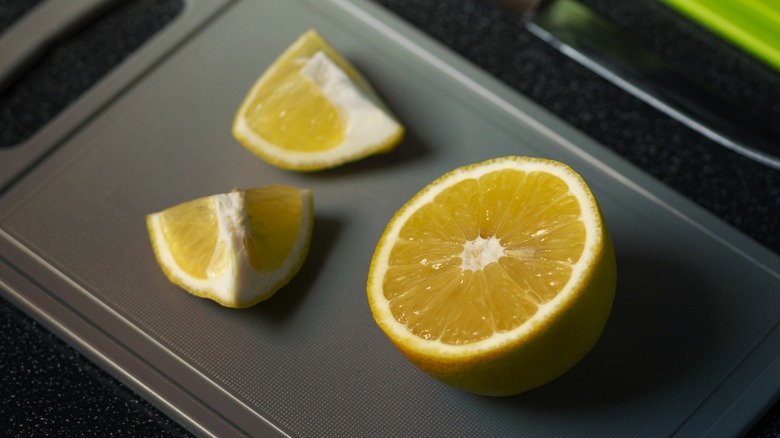Should You Store Lemons In The Fridge Or A Fruit Bowl?
A fruit bowl filled with bright yellow lemons can really liven up your kitchen — for about a week. Though storing them on your counter or tabletop keeps them within reach and makes a delightful centerpiece, this isn't the best way to make the most of your citrus. This fruit has porous skin through which moisture escapes, leaving you with hard, dry fruit in days.
If they're not completely shriveled, though, you can soften hard lemons to make them easier to juice with a quick zap in the microwave. What's more, they're sensitive to ethylene, the gas produced by many fruits, including bananas and avocados, that makes nearby produce spoil faster. If you must store your lemons in a fruit bowl, keep them in the coolest part of your kitchen, away from sunlight.
Lemons are cold-loving citrus fruits that thrive in temperatures between 50 and 54 degrees Fahrenheit. They'll suffer chilling injuries if they're kept too cold, so make sure they're either in the crisper drawer or close to the front of your fridge. These fruit also like humidity, which keeps them from drying out. If your crisper drawer has an adjustable vent, close it to create a humid environment.
Or store them in a sealed plastic container in the main part of your fridge. There, you can expect them to be good for around two to four weeks. Never store your citrus in water, as this won't make them last longer but can instead lead to foodborne illnesses.
How to store leftover lemons
Once you've sliced a lemon, any leftover fruit should be refrigerated. This is because a cut lemon is now especially vulnerable to losing moisture as well as succumbing to mold and bacterial overgrowth. If you have a leftover lemon half, tightly cover the exposed fruit with plastic wrap, or store any leftover slices or wedges in an airtight container or plastic bag. Sliced, refrigerated lemons are only good for a few days in the fridge, quickly losing flavor and quality, so it's best to enjoy them as soon as you can.
For even more life from your lemons, consider freezing their juice, slices, zest, or even the whole fruit. You can freeze lemons for longer-lasting freshness for up to three to four months for the best quality. The fruit itself will become mushy upon defrosting, so the slices will no longer make a pretty garnish, but the juice and rind will still pack plenty of flavor. Plus, frozen lemons are much easier to zest than fresh ones, making it easy to add color and flavor to your dishes at any time.


